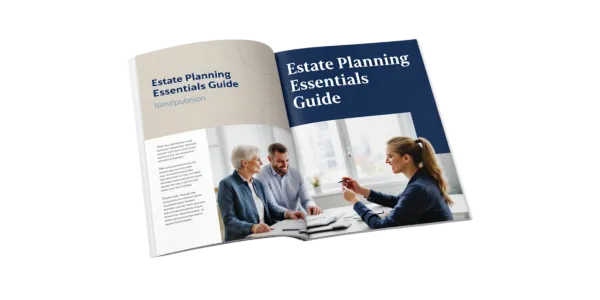Estate Planning Services
Preparing confidently for the future with clear and compassionate guidance

Your Legacy Deserves More Than Chance
Have you ever wondered what would happen to your home, your savings, or your cherished possessions if you suddenly couldn't make decisions for yourself?
Who would speak for you regarding your medical care? Would your loved ones face confusion, conflict, or costly court proceedings during an already difficult time?
"Estate planning isn't just about distributing assets—it's about protecting your legacy, expressing your wishes, and giving your loved ones the gift of clarity during difficult times."
Beyond Wills: The Essential Elements of Modern Estate Planning
Many seniors believe that having a simple will is sufficient for estate planning. However, comprehensive estate planning addresses not just what happens after you're gone, but also protects you and your assets during your lifetime. A complete estate plan typically includes:
Will
Directs the distribution of assets that go through probate and names guardians for minor children or dependents.
Trust
Allows assets to bypass probate, potentially reducing taxes and providing privacy and control over how and when beneficiaries receive assets.
Power of Attorney
Designates someone to make financial decisions on your behalf if you become unable to do so.
Advance Healthcare Directive
Specifies your medical care preferences and appoints someone to make healthcare decisions if you cannot.
HIPAA Authorization
Allows designated individuals to access your medical information, facilitating informed healthcare decisions.
Property Ownership Strategies
Structures like joint tenancy or transfer-on-death deeds that can help certain assets avoid probate.
"I kept putting off estate planning because it seemed complicated and, frankly, a bit depressing. Talesa helped me understand how important it was and connected me with an attorney who made the process surprisingly straightforward. Now I have peace of mind knowing my wishes will be honored and my children won't face unnecessary burdens."
— William S., 76, Menifee
The Profound Benefits of Proper Estate Planning
Taking the time to create a comprehensive estate plan offers significant benefits for both you and your loved ones:
Peace of Mind
The comfort of knowing your affairs are in order and your wishes will be honored, regardless of what the future holds.
Avoid Probate
Properly structured estate plans can help assets bypass the costly, time-consuming, and public probate process.
Prevent Family Conflict
Clear instructions reduce the potential for disagreements among family members during emotionally difficult times.
Protect Vulnerable Beneficiaries
Special provisions can be made for minors, beneficiaries with disabilities, or those who may need protection from creditors or their own spending habits.
Support Causes You Care About
Incorporate charitable giving into your legacy, potentially with tax advantages for your estate or beneficiaries.
Minimize Taxes and Expenses
Strategic planning can reduce estate taxes, income taxes, and administrative costs, preserving more of your assets for your beneficiaries.
My Role in Your Estate Planning Journey
As your Senior Transition Specialist, I don't prepare legal documents or provide legal advice. Instead, I serve as your guide and coordinator, helping you navigate the estate planning process with confidence:

◉ Initial Discussion
We'll have a thoughtful conversation about your goals, concerns, and unique family situation to help clarify your estate planning needs.
◉ Attorney Referrals
I'll connect you with reputable estate planning attorneys in the Menifee area who specialize in senior concerns and can address your specific needs.
◉ Document Organization
I'll help you gather and organize the information and documents your attorney will need, making the process more efficient and thorough.
◉ Meeting Preparation
I can help you prepare for attorney meetings by developing questions, clarifying legal terminology, and ensuring your concerns are addressed.
◉ Implementation Support
After your documents are prepared, I can help ensure your estate plan is properly implemented, including assistance with asset retitling or beneficiary designations.

Free Resource:
"Estate Planning Essentials" Guide
To help you begin your estate planning journey, I've created a comprehensive guide that includes:
Estate planning terminology explained in plain language
Document checklist for meeting with an attorney
Questions to ask potential estate planning attorneys
Information about California-specific estate laws, including Prop 19
Asset inventory worksheets to help catalog your estate

Ready to Secure Your Legacy?
I invite you to schedule a no-obligation consultation to discuss your estate planning needs and how I can help connect you with the right resources.
During this conversation, we'll talk about your specific concerns and begin developing a plan to address them.
Frequently Asked Questions About Estate Planning
When should I start estate planning?
The best time to begin estate planning is now, regardless of your age or asset level. However, estate planning becomes particularly important during these life events:
✔️ Reaching retirement age: As you transition to retirement, reviewing your estate plan ensures it aligns with your current financial situation and goals.
✔️ Experiencing health changes: New diagnoses or health concerns make it essential to have healthcare directives and powers of attorney in place.
✔️ After the loss of a spouse: Widows and widowers often need to update their estate plans to reflect their new circumstances.
✔️ Before a major move: Relocating to a new state may affect the validity of existing documents or introduce new state-specific considerations.
✔️ Changes in family dynamics: Births, deaths, marriages, divorces, or estrangements may necessitate updates to your beneficiary designations.
Even if you already have basic estate planning documents, regular reviews (every 3-5 years or after significant life events) are important to ensure your plan still reflects your wishes and complies with current laws.
Remember that estate planning isn't just for the wealthy—everyone benefits from having clear instructions for their care and the distribution of their assets, regardless of estate size.
What's the difference between a will and a trust?
Wills and trusts are both important estate planning tools, but they serve different purposes and offer different benefits:
Will:
✔️ Takes effect only after death
✔️ Must go through probate (court process)
✔️ Becomes public record during probate
✔️ Names guardians for minor children
✔️ Directs distribution of assets that don't have designated beneficiaries or aren't in trust
✔️ Names an executor to manage the estate
✔️ Generally less expensive to create initially
Trust (specifically, a revocable living trust):
✔️ Takes effect as soon as it's created and funded
✔️ Avoids probate for assets properly titled in the trust
✔️ Remains private (not public record)
✔️ Provides management of assets during incapacity
✔️ Can include detailed instructions for asset distribution
✔️ Names successor trustees to manage the trust
✔️ More expensive to create initially but may save money and time later
Many comprehensive estate plans include both a will (often called a "pour-over will" that catches any assets not in the trust) and a revocable living trust. The best approach depends on your specific situation, including the complexity of your assets, your privacy concerns, and your state's probate laws.
An estate planning attorney can help you determine whether a will, trust, or combination of both is most appropriate for your circumstances.
What happens if I die without an estate plan in California?
Dying without an estate plan in California (known as dying "intestate") means the state's intestacy laws will determine who receives your assets, regardless of what you might have wanted:
✔️ If you have a spouse and children: Your spouse receives all community property and a portion of your separate property, with the remainder going to your children.
✔️ If you have a spouse but no children: Your spouse receives all community property and a portion of your separate property, with the remainder potentially going to your parents or siblings.
✔️ If you have children but no spouse: Your children inherit everything equally.
✔️ If you have neither spouse nor children: Assets typically go to parents, siblings, or other relatives according to a specific hierarchy.
Beyond asset distribution, dying without an estate plan has other significant consequences:
✔️ Probate process: Your estate will go through probate, which is public, potentially lengthy (9-18 months in California), and can consume 4-7% of your estate in fees.
✔️ Court-appointed administrator: The court will appoint someone to manage your estate, possibly someone you wouldn't have chosen.
✔️ Guardian decisions: If you have minor children, the court will decide who raises them, without guidance from you.
✔️ No incapacity planning: Without powers of attorney and healthcare directives, your family may need to pursue conservatorship if you become incapacitated before death.
✔️ No tax planning: Your estate may pay more in taxes than necessary without proper planning.
Creating even a basic estate plan allows you to maintain control over these important decisions rather than leaving them to California's default rules, which may not align with your wishes.
How does Proposition 19 affect estate planning in California?
Proposition 19, which took effect in California on February 16, 2021, significantly changed property tax rules for inherited properties, making estate planning even more important for California homeowners:
Key changes under Proposition 19:
✔️ Primary residence transfers to children: Children can only inherit their parents' property tax assessment if they use the home as their primary residence AND the property's market value at the time of transfer is not more than $1 million over the assessed value.
✔️ Investment and vacation properties: The previous parent-child exclusion for up to $1 million of assessed value for non-primary residences has been eliminated. These properties will now be reassessed at current market value when transferred.
✔️ Tax basis portability: Homeowners over 55, severely disabled, or victims of natural disasters can now transfer their tax basis to a replacement home anywhere in California (not just within certain counties) up to three times.
Estate planning implications:
✔️ Families need to carefully consider whether children will use inherited property as their primary residence.
✔️ For high-value homes or those with significant appreciation, additional planning may be needed to address potential property tax increases.
✔️ Trusts may need to be updated to account for these new rules.
✔️ Life insurance might be considered to help heirs pay increased property taxes.
✔️ Some families may benefit from lifetime gifting strategies rather than transfers at death.
Given these significant changes, California homeowners should consult with both estate planning attorneys and tax professionals to understand how Proposition 19 affects their specific situation and what strategies might help minimize the impact on their heirs.
I can connect you with professionals who specialize in navigating these complex property tax issues as part of comprehensive estate planning.
What documents should everyone have in their estate plan?
A comprehensive estate plan typically includes these essential documents:
✔️ Last Will and Testament: Directs the distribution of probate assets, names an executor to manage your estate, and designates guardians for minor children.
✔️ Durable Power of Attorney for Finances: Appoints someone to manage your financial affairs if you become incapacitated. Without this, your family may need to pursue a costly court conservatorship.
✔️ Advance Healthcare Directive: Combines a living will (specifying your medical treatment preferences) with a healthcare power of attorney (naming someone to make medical decisions if you cannot).
✔️ HIPAA Authorization: Allows designated individuals to access your medical information, which is essential for those helping with your healthcare.
Many estate plans also include these additional documents based on individual needs:
✔️ Revocable Living Trust: Avoids probate, provides privacy, and allows for management of assets during incapacity and specific distribution instructions after death.
✔️ Pour-Over Will: Works with a trust to ensure any assets not already in your trust are "poured over" into it after death.
✔️ Letter of Intent: Provides additional guidance to your executor or trustee about your wishes, including funeral preferences, personal property distribution, or care for pets.
✔️ Beneficiary Designations: Not technically a document in your estate plan, but crucial to review and update for life insurance, retirement accounts, and other assets that pass by beneficiary designation.
The specific documents you need depend on your unique situation, including your assets, family structure, and goals. An estate planning attorney can help you determine which documents are most important for your circumstances.
How often should I update my estate plan?
Estate plans should be reviewed regularly and updated when significant life events or legal changes occur. As a general rule:
Regular reviews: Even without major life changes, review your estate plan every 3-5 years to ensure it still reflects your wishes and complies with current laws.
Update your estate plan when these life events occur:
✔️ Family changes: Marriage, divorce, birth, adoption, death, or estrangement
Financial changes: Significant increase or decrease in assets, buying/selling a business, receiving an inheritance
✔️ Health changes: New diagnoses or declining health that might affect your care needs
Relocation: Moving to a different state, as estate laws vary by state
✔️ Changes in beneficiary circumstances: A beneficiary develops special needs, addiction issues, or financial problems
✔️ Changes in executor/trustee/agent: Your named representatives become unable or unsuitable to serve
Update your estate plan when these legal changes occur:
✔️ Tax law changes that affect estate, gift, or income taxes
✔️ State law changes affecting probate, property, or healthcare directives
✔️ New estate planning options or strategies become available
Remember that updating your estate plan isn't just about the legal documents—it's also important to review and update beneficiary designations on life insurance policies, retirement accounts, and other assets that pass outside your will or trust.
I recommend setting a calendar reminder to review your estate plan every few years, and I'm happy to connect you with an estate planning attorney who offers regular review services to ensure your plan remains current and effective.
How can I minimize family conflicts over my estate?
Family conflicts over estates often arise from unclear intentions, perceived unfairness, or poor communication. Here are strategies to help minimize potential disputes:
✔️ Create clear, legally sound documents: Work with an experienced estate planning attorney to ensure your documents are properly executed and clearly express your wishes.
✔️ Consider a no-contest clause: This provision can discourage challenges by stating that anyone who contests your will or trust receives nothing.
✔️ Choose fiduciaries carefully: Select executors, trustees, and agents who are trustworthy, financially responsible, and able to withstand family pressure. Consider naming a professional or neutral third party for complex situations.
✔️ Explain unequal distributions: If you're not dividing assets equally among children or other heirs, consider explaining your reasoning either in person or through a letter of explanation included with your estate documents.
✔️ Address personal property specifically: Family conflicts often center on sentimental items. Consider creating a personal property memorandum listing who should receive specific items.
✔️ Consider lifetime gifts: Making gifts while you're alive allows you to see your beneficiaries enjoy them and address any concerns that arise.
✔️ Hold a family meeting: Consider discussing your general estate plans with family members while you're alive, possibly with your attorney or financial advisor present to answer questions.
✔️ Use a trust: Unlike wills, trusts remain private and don't go through public probate proceedings, potentially reducing the opportunity for disputes.
Remember that complete transparency isn't always necessary or helpful—the level of detail you share should depend on your family dynamics. The goal is to provide enough clarity to prevent misunderstandings while maintaining your privacy and control over your decisions.
I can help facilitate family conversations about estate planning or connect you with mediators who specialize in family estate discussions if you anticipate potential conflicts.
How much does estate planning cost?
Estate planning costs vary based on the complexity of your situation and the specific documents needed. In the Menifee area, you can generally expect these approximate ranges:
Basic will package: $800-$1,500
Simple will
Durable power of attorney
Advance healthcare directive
HIPAA authorization
Comprehensive estate plan with trust: $2,000-$5,000
Revocable living trust
Pour-over will
Durable power of attorney
Advance healthcare directive
HIPAA authorization
Property transfer documents
Complex estate planning: $5,000+
Specialized trusts (special needs trusts, irrevocable trusts, etc.)
Business succession planning
Advanced tax planning strategies
Multi-generational planning
Additional costs to consider:
✔️ Funding a trust: There may be additional costs for transferring assets into your trust, such as deed preparation and recording fees.
✔️ Regular updates: Expect to pay for reviews and updates every few years or after significant life events.
✔️ Probate costs (if avoided through planning): In California, probate fees can range from 4-7% of the estate value, so proper planning can result in significant savings.
Most estate planning attorneys offer a free or low-cost initial consultation and can provide a clear fee quote based on your specific needs. Many offer flat-fee packages rather than hourly billing for standard estate plans.
While cost is certainly a consideration, remember that estate planning is an investment that can save your heirs significant money, time, and stress in the future.

TALESA AGUIRRE
SRES® - Senior Real Estate Specialist
CA DRE 02202185
This site and the products and services offered on this site is in no way sponsored, affiliated, endorsed or administered by, or associated with, Facebook™ or Google™. Nor have they been reviewed tested or certified by Facebook™.
You understand that you are providing your information to Talesa Aguirre - Senior Transition Specialist and not to Facebook™ or Google™. The information you provide will only be used by Talesa Aguirre - Senior Transition Specialist.
© Copyright 2026. Talesa Aguirre - Real Estate Agent. All Rights Reserved. Privacy Policy | Terms and Conditions